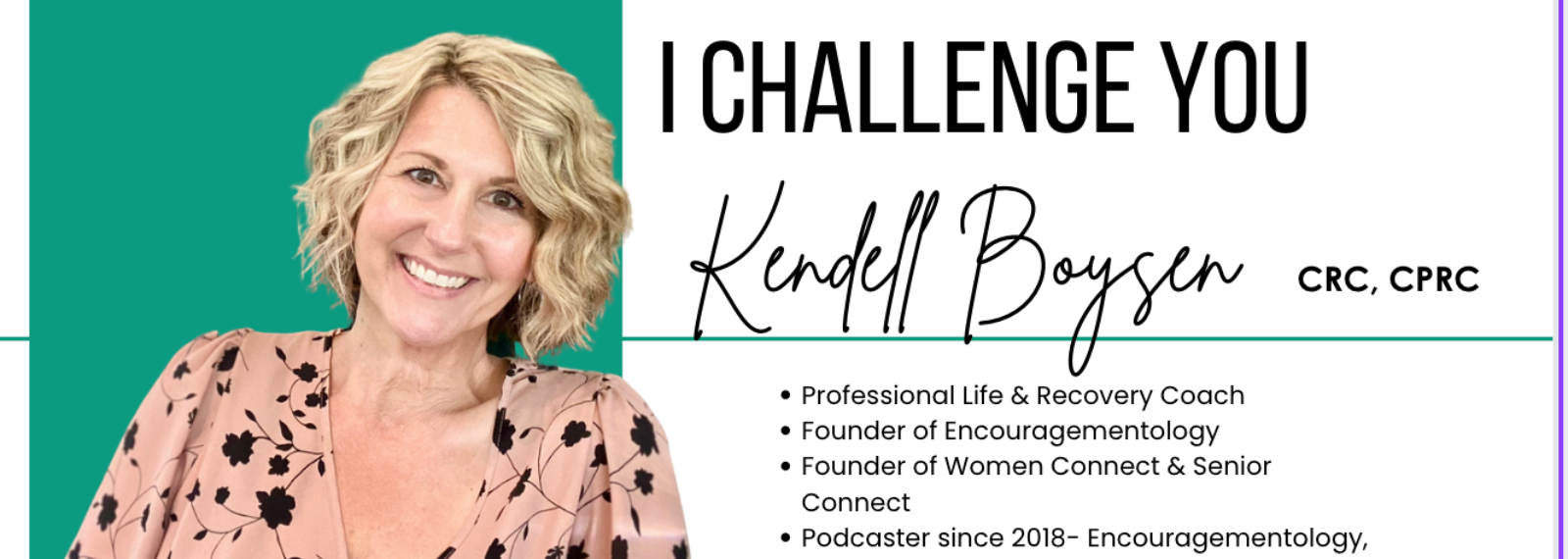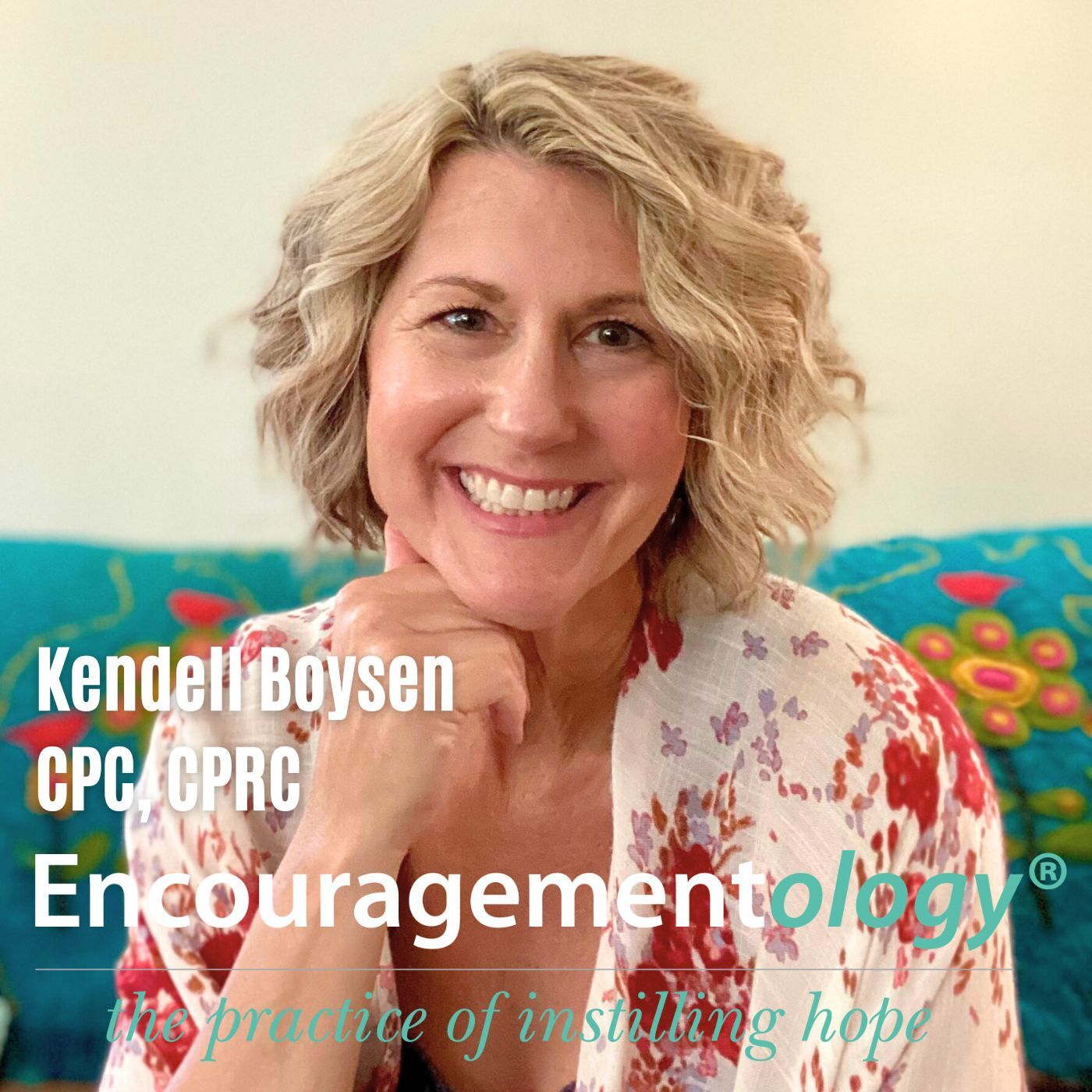Episodes
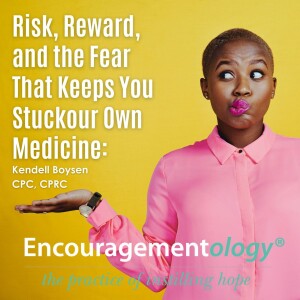
Saturday May 17, 2025
Risk, Reward, and the Fear That Keeps You Stuck
Saturday May 17, 2025
Saturday May 17, 2025
SHOW NOTES:
On this show…we are exploring risk vs reward and the fear that keeps you stuck. If you’re someone who shies away from taking risks because you’re terrified of failure, I’m speaking to you today. We’re diving deep into the tension between risk and reward, why people stay stuck, and how you can break free from the cycle of fear. We’ll explore why fear holds us back, how to bounce back when things don’t go as planned, and most importantly—how to take calculated risks that can lead to growth, success, and a life that feels more aligned with your true potential.
In this episode, you’re going to learn about the courage to fail and why it’s one of the most powerful tools you can have in your personal and professional development. We’ll unpack the fears that keep us from stepping out of our comfort zones, why those fears don’t always match reality, and how embracing the unknown can actually lead to greater rewards than staying in the safety of what’s familiar. By the end of the episode, you’ll have some tangible ways to start taking those risks, handling failure with grace, and moving forward into the growth you deserve.
Let’s break this down. Risk is the possibility of losing something of value—whether it’s time, energy, money, or reputation. Reward is what you gain in return: success, growth, opportunity, and personal development. The key to moving forward is understanding that with risk comes reward, but it’s not always immediate, and it’s not always what you expect.
Why are we afraid to take risks? It all comes back to fear—fear of failing, fear of judgment, and fear of the unknown. But the reality is, failure is not the end. It’s a step in the process of learning, growth, and progress.
Taking risks is a natural part of growth. Every successful person has faced failure, rejection, and even the sting of loss. The difference between those who succeed and those who stay stagnant is the ability to push past those fears and keep moving forward. It’s about embracing the discomfort and trusting that the reward will be worth the risk.
Shonda Moralis asks is Fear of Failure Holding You Back?
Emily Boynton enlightens us with Why Taking Risks Helps You Grow — and How to Do It
Is Failure Necessary? | Simon Sinek
CHALLENGE: This week, take one risk that’s been scaring you, even if it’s just a baby step. Whether it’s starting that side project, speaking up in that meeting, or taking a leap in your personal life—go for it! Take that step with the confidence that no matter the outcome, you are learning, growing, and moving forward.
I Know YOU Can Do It!
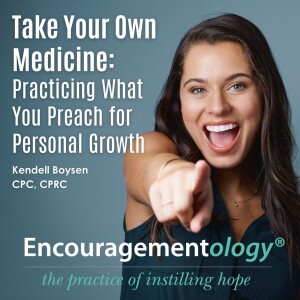
Wednesday May 07, 2025
Take Your Own Medicine: Practicing What You Preach for Personal Growth
Wednesday May 07, 2025
Wednesday May 07, 2025
SHOW NOTES:
On this show…we are making a commitment to take our own medicine and practice what we preach to achieve authentic personal growth. Have you ever caught yourself dishing out great advice—maybe even life-changing advice—only to realize you’re not actually taking it yourself? You’re not alone. For me, this became very real when I paused and thought, Wait a minute… am I applying the very same healing and growth tools I’ve spent years teaching others? It’s easy to guide, encourage, and support someone else’s transformation—it feels great, even! But when it comes time to turn that spotlight inward, it can get a little… uncomfortable. Personal accountability doesn’t come with a script. There’s no applause when you do the hard inner work in private. Just you, your truth, and the mirror.
In this episode, we’re digging into the idea of “taking your own medicine.” It’s not about shame—it’s about alignment. About realizing that personal growth isn’t just something we facilitate for others—it’s something we owe ourselves too. If you’ve been operating on auto-pilot, pushing others to grow while neglecting your own healing, it’s time to come home to yourself. Let’s gently peel back the layers and explore how self-honesty, ownership, and a little humility can lead to some of the most powerful transformation yet.
Let’s start by unpacking this phrase—“take your own medicine.” It’s one of those sayings we toss around casually, but it carries some weight when you really sit with it. In its simplest form, it means applying the same advice, tools, and strategies to yourself that you so easily hand out to others. It’s about walking your talk. Practicing what you preach. But more than that—it’s about integrity.
When you give others guidance on healing, setting boundaries, processing pain, or embracing change, it usually comes from a place of experience or education. But if you’re not actually applying those practices to your own life, there’s a gap—a disconnect. And that disconnect can create feelings of inauthenticity, burnout, or even imposter syndrome. You might look like you have it all together on the outside, while inside, you’re quietly struggling with the same things you’re helping others overcome.
Taking your own medicine means making time for your own emotional maintenance. It means slowing down long enough to check in and ask: Am I living in alignment with what I believe? It doesn’t require perfection—it just asks for honesty and willingness. Because growth isn’t just about knowledge—it’s about embodiment.
Brian Ford - Why It’s Hard To Take Your Own Advice
Why Personal Responsibility Is Key to Changing Your Life - Daniel Mangena
Check Yourself - Accountability | Charlie Johnson | TEDxNormal
CHALLENGE: Stop waiting for clarity to strike from the outside and start holding yourself accountable from the inside. Take the advice you so freely give, turn it inward, and begin showing up for your own healing with the same grace and determination you offer others.
I Know YOU Can Do It!
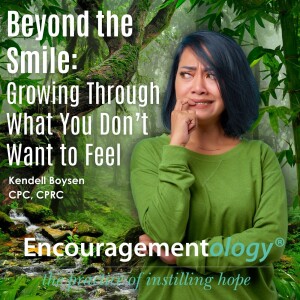
Tuesday Apr 29, 2025
Beyond the Smile: Growing Through What You Don’t Want to Feel
Tuesday Apr 29, 2025
Tuesday Apr 29, 2025
On this show…we are going beyond the smile to understand that sometimes you have to grow through what you don’t want to feel. How often have you heard, “Just stay positive!” as a magic fix for life’s problems? It sounds good—and sometimes it is good—but what happens when positivity turns into a clever disguise for real, messy emotions? For a lot of us, especially those who are naturally peacekeepers or conflict-avoiders, it’s easier to slap on a smile, let things “roll off our back,” and move on… at least on the outside. But inside? Inside, we might be skipping important work—growth work—that only happens when we’re willing to sit with a little discomfort.
In this episode, we’re diving into the powerful ideas of Capacity Expert RaQuel Hopkins, who challenges the myth that you have to choose between being positive and being real. What if true growth isn’t about avoiding hard feelings—but about honoring them, learning from them, and letting them change us? If you, like me, have ever found yourself managing the appearance of being unbothered while quietly carrying unresolved emotions, you’re going to feel seen today. Let’s crack open this idea together and explore how feeling more can actually lead to living more.
Let’s start by breaking down this idea of emotional capacity. In simple terms, emotional capacity is your ability to experience, process, and integrate a wide range of emotions—both the pretty and the painful—without shutting down, lashing out, or checking out.
When we don’t stretch our emotional capacity, we end up stuck in a narrow lane of “acceptable” feelings: happy, fine, maybe a little stressed but functional. Anything outside that—anger, grief, sadness, disappointment—either gets stuffed down, rushed through, or paved over with “good vibes only” slogans. But the problem with skipping emotions isn’t just emotional. Over time, it limits our capacity for intimacy, resilience, creativity, and real personal growth.
RaQuel Hopkins teaches that growth comes from allowing yourself to fully experience friction, not rush past it. Friction isn’t failure; it’s feedback. And when you avoid it—when you smooth it over with positivity or pretend it doesn’t bother you—you’re not protecting your peace, you’re stunting your growth. Real capacity building happens when we practice being present with discomfort long enough to actually learn from it.
Doretta Bendalin offers the Truth: How Sweeping it Under the Rug Hurts You. Found at Medium
At Grouport I found more info on Understanding Emotional Avoidance: A Deep Dive
3 Toxic Mental Health Trends with RaQuel Hopkins, Capacity Expert
CHALLENGE: Stop sweeping discomfort under the rug and start seeing it as a doorway to your next level of growth. Instead of waiting for peace to find you, choose to meet your emotions where they are—and build the resilience to carry yourself forward with honesty and heart.
I Know YOU Can Do It!

Tuesday Apr 22, 2025
Mood Matters: How Your Inner World Shapes Your Outer Experience
Tuesday Apr 22, 2025
Tuesday Apr 22, 2025
SHOW NOTES:
On this show…we are recognizing that moods matter because our inner world dramatically shapes our outer experience. Have you ever waited on someone—or something—to change the energy in the room, cheer you up, or just make the day feel better? Maybe you’ve thought, “If they’d just smile,” or “If one good thing would happen, maybe I’d feel different.” We’ve all been there, hoping for a rescue from a funk we can’t quite shake. But what if we’ve been giving away way too much power? What if the secret to turning the day around isn’t out there somewhere, but already within us?
In this episode, we’re flipping the script. Instead of waiting for something to shift our mood, we’re exploring how our mood might actually be the thing shifting everything else. How we think, how we feel, how we choose to respond—it all ripples out and shapes what comes next. Could it be that we’re the thermostat, not the thermometer? That we’re not just reacting to the world but co-creating it in real time? Let’s dig into what this means, how to tell when our mindset is steering the ship (and when it’s stuck in a ditch), and how we can use this awareness to show up differently—even when the world around us stays the same.
Let’s kick things off with a truth that feels simple on the surface but hits a little deeper the more you sit with it: your mood shapes your experience more than your experience shapes your mood. We often think we’re reacting to what’s happening around us, but in reality, we’re often reacting to what’s happening within us—and that response colors the whole scene.
This idea leans into what psychologists call “emotional reasoning”—where we believe something is true based solely on how we feel. For example, if I feel overwhelmed, I assume the situation is chaotic. If I feel ignored, I assume people don’t care. But the kicker? The situation may not actually be that bad—it just feels that way because of the emotional lens I’m looking through. It’s like wearing sunglasses indoors and wondering why everything looks dim.
Our brains are wired to scan for threats, to make quick judgments, and to look for evidence that supports how we already feel. That’s called confirmation bias, and when we’re in a funk, our minds will happily hand us proof that the day is, in fact, garbage. But here’s the good news: once you realize this, you can interrupt the loop. You can change the glasses, so to speak. You can take back control of your mood and, with it, the way you engage with the world.
So rather than waiting for something outside of you to cheer you up or “fix” the day, what if you became your own emotional thermostat? Not to fake positivity or push feelings aside—but to gently shift how you interpret the moment, choose your response, and create a ripple effect from the inside out.
Dr. Tracey Marks on Why you’re an emotional sponge and 5 Tips for Better Boundaries
CHALLENGE: Take ownership of your mood today. Recognize that by adjusting your internal narrative, you have the power to transform not only your own experience but also the world around you. Enjoy this new found freedom.
I Know YOU Can Do It!

Wednesday Apr 16, 2025
Unspoken: How Body Language Communicates What Words Can’t
Wednesday Apr 16, 2025
Wednesday Apr 16, 2025
SHOW NOTES:
On this show… we are exploring the unspoken to learn how body language communicates what words can’t. Have you ever walked into a room and immediately felt something… off? No one said a word, but somehow, you just knew—you weren’t welcome at that table, or someone just had an argument in the kitchen. That’s the beauty (and sometimes the awkwardness) of body language. It speaks loud and clear—even when our mouths are saying, “I’m fine!”
In this episode, we’re digging into all those silent signals we send—whether we mean to or not. From the crossed arms that scream “I’m not open to feedback,” to the smile that doesn’t quite reach your eyes… we’re decoding what’s really being said when nothing’s being said at all. Body language isn’t just a sideshow to the conversation—it is the conversation. And once you learn to read it (and manage your own), you’ll start to feel more connected, more confident, and—yes—even a little more in control of how you’re coming across.
Let’s take a closer look at the language we’ve all been speaking since before we said our first words. You might just be surprised what your body’s been saying behind your back.
I’ll start by stating the obvious… but also the often-overlooked: we’re talking all the time—even when we’re not saying a word. Whether it’s the way we cross our arms, how long we hold eye contact, or the way our faces betray us mid-sentence, body language is this constant, silent sidekick to our spoken communication. And more often than not, it’s doing the real talking.
Body language is made up of all the nonverbal cues we use to express ourselves—things like facial expressions, posture, gestures, eye movements, even how close we stand to someone. It’s a full-blown language… just without the dictionary. According to researchers, nonverbal communication can account for up to 70–90% of how our messages are received. Which means the tone of your voice and the look on your face might be saying more than your words ever could.
And here’s the kicker: while we’re often very aware of what we say, we’re not nearly as tuned in to what our bodies are saying. That can lead to all kinds of mixed messages—like smiling while delivering bad news (awkward), or nodding when you actually disagree. We don’t always realize what we’re broadcasting.
There are also cultural differences to consider. What feels like an innocent gesture in one country might be offensive in another. And what seems like eye contact to you might feel like a stare-down to someone else. So body language isn’t one-size-fits-all—but it is universal in the sense that we’re all doing it, all the time.
So, why does this matter? Because when we become more aware of our own nonverbal habits—and better at reading others’—we show up more authentically. We connect more deeply. We avoid unnecessary misunderstandings. And we walk away from interactions not just having talked, but having been heard and understood.
Tom Morrison explains What Your Body Language Says About Your Leadership Impact
CHALLENGE: Become more conscious of your nonverbal cues and observe how they influence your interactions. By aligning your body language with your intentions, you can foster more genuine and impactful connections. Show up as you, fully you.
I Know YOU Can Do It!
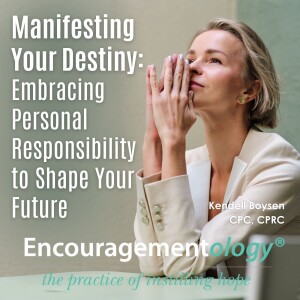
Thursday Apr 10, 2025
Manifesting Your Destiny: Embracing Personal Responsibility to Shape Your Future
Thursday Apr 10, 2025
Thursday Apr 10, 2025
SHOW NOTES:
On this show…we are embracing personal responsibility to shape our futures as we manifest our destiny. Have you ever paused to consider the role you play in crafting your own life story? It’s a compelling notion that the outcomes we experience—both triumphs and setbacks—are not merely products of chance, but reflections of our own intentions and actions. This perspective invites us to delve into the profound connection between our thoughts, behaviors, and the realities we encounter.
In this episode, we’re embarking on an enlightening journey to explore the concept that “that which we manifest is before us.” We’ll unravel how our conscious and unconscious choices shape our destinies, and how embracing personal responsibility can empower us to steer our lives toward fulfillment and purpose. This isn’t about casting shadows of blame, but about illuminating the paths of possibility that open up when we acknowledge our role as architects of our own fate.
Let’s kick things off by getting on the same page about what we’re really talking about when we say, “That which we manifest is before us.” Sounds poetic, maybe even mystical, right? But it’s actually a lot more practical—and empowering—than it might seem at first glance.
Manifestation is the idea that the thoughts we think, the intentions we set, and the beliefs we hold have a powerful influence over the reality we experience. It’s not just about wishing for something and hoping it appears out of thin air—it’s about recognizing the role our mindset, choices, and focus play in shaping our path. It’s like planting seeds in a garden: the quality of your thoughts determines what grows, and your effort is what brings it to life.
Now let’s pair that with personal responsibility—the idea that we are not just passive observers of our lives, but active participants. This doesn’t mean blaming ourselves for every hiccup or hardship. Life happens, and some things are out of our control. But when we step back and really look at our habits, our self-talk, our patterns—what we believe about what we’re capable of—we often find that we’ve played a bigger role in our outcomes than we realized.
Here’s where it gets really interesting: we’re always manifesting—whether we know it or not. Through action or inaction. Through clarity or confusion. If you’ve ever said, “I knew this was going to happen,” good or bad, chances are… that thought planted a seed. And when we’re not clear about what we want, or when we let fear and limiting beliefs steer the wheel, we can manifest outcomes that don’t serve us—outcomes that feel like they just “happened” to us, when really, we helped create the conditions.
So no, this isn’t about magical thinking—it’s about mindful thinking. It’s about checking in with yourself and asking, “What am I putting out into the world through my energy, choices, and beliefs?” Because more often than not, that’s exactly what shows up in front of you.
Dr. Tchiki Davis on “What Is Manifestation? Science-Based Ways to Manifest” from Psychology Today.
Alright, let’s break this down—manifestation in a nutshell.
First, manifestation isn’t magic. It’s not about wishing really hard and waiting for the universe to deliver your dream on a silver platter. Instead, it’s about aligning your thoughts, emotions, and behaviors to move toward the life you want.
Second, your mindset matters—a lot. What you believe about yourself and your future can shape your motivation, your resilience, and even how you interpret setbacks. A strong, focused mindset helps you stay committed and open to opportunity.
Third, action is key. You can visualize the perfect job, the dream relationship, or the peaceful life—but unless you’re taking consistent steps in that direction, you’re just daydreaming. Manifestation works best when your intention meets effort.
And finally, positive thinking alone isn’t enough—you also need clarity, self-awareness, and a willingness to grow through challenges. It’s about co-creating your life with purpose, not passively hoping everything will work out.
Focus on What You Can Control, Leave What You Can't by Hannah Briame at Becoming Who You Are
Mel Robbins hosted Dr. James Doty to talk about Manifestation
CHALLENGE: Take a moment to reflect on an area of your life where you’d like to see change. Identify one specific goal, visualize the outcome, and outline the steps you’ll take to achieve it. Embrace your role as the creator of your destiny, and watch as your intentions transform into reality.
I Know YOU Can Do It!

Wednesday Apr 02, 2025
The Certainty Trap: Are You as Right as You Think?
Wednesday Apr 02, 2025
Wednesday Apr 02, 2025
SHOW NOTES:
On this show…we are attempting to avoid the Certainty Trap by asking, "Are you as right as you think you are?" Have you ever felt so sure you were right about something, only to later discover there was more to the story—or a completely different side you hadn’t considered? That moment can be humbling, even a little uncomfortable, but it’s also where growth begins.
We’ve all been there—standing our ground, convinced that our perspective is the correct one. Whether it’s a debate about current events, a disagreement in a relationship, or simply our interpretation of a situation, we often hold tightly to our beliefs. In this episode, we’re diving into the human tendency to cling to certainty, even when we might not have all the facts. We’ll explore the importance of self-awareness, the value of considering opposing viewpoints, and how embracing a bit of uncertainty can lead to personal growth and deeper connections with others. So, let’s challenge our assumptions and open the door to new perspectives—who knows what we might discover?
Let’s start by calling out the very human thing we all do: we like to be right. I mean, who doesn’t? Being right feels good—it’s validating, it’s safe, and it gives us a sense of control. But the brain takes it a step further. Scientifically speaking, our brains are wired to protect our current beliefs. We’re not just thinking—we’re filtering, editing, and defending. This is thanks to something called confirmation bias, which is your brain’s way of saying, “Let’s only pay attention to the stuff that proves we already know what we’re talking about.”
Here’s a real-life example: you’ve decided your partner never listens to you. So, every time they forget something you said—ding ding ding—more proof. But when they do listen? You might not notice. Or maybe you write it off as a fluke. That’s confirmation bias in action. You’re scanning for evidence that supports what you already believe and quietly ignoring what doesn’t fit.
Then there’s overconfidence bias, which is exactly what it sounds like: thinking we know more than we do. Ever found yourself mid-debate, completely certain about a “fact” you read online… only to later realize you misread it or, oops, it was a meme? Yeah, same. Our brains often give us the feeling of being right before we’ve actually done the homework. And once we’re feeling confident, our openness to alternative views tends to shrink like jeans in the dryer.
Now, let’s turn the mirror inward. It’s time for a little self-reflection:
Recall a Recent Disagreement: Think about a recent situation where you were convinced you were right. What was the topic? Who were you discussing it with?
Identify Your Sources: What information did you base your opinion on? Was it firsthand experience, something you read, or perhaps information from someone you trust?
Consider the Other Perspective: What was the other person’s viewpoint? Can you understand why they might see things differently?
Assess Your Openness: During the discussion, were you genuinely open to hearing the other side, or were you more focused on proving your point?
Reflect on the Outcome: How did the conversation end? Did you learn something new, or did it reinforce your original belief?
By engaging in this exercise, you may uncover patterns in your thinking and identify areas where you can be more receptive to differing viewpoints.
Certainty Is a Psychological Trap and It's Time to Escape also found at Psychology Today
Let’s go to the well….Annie Duke explains why being uncertain is a hidden strength
CHALLENGE: Identify one belief or opinion you hold with absolute certainty and actively seek out information or perspectives that challenge it. Embrace the discomfort of uncertainty, and observe how this openness can lead to deeper understanding and personal growth. Remember, true wisdom often begins with the acknowledgment of what we don’t know.
I Know YOU Can Do It!
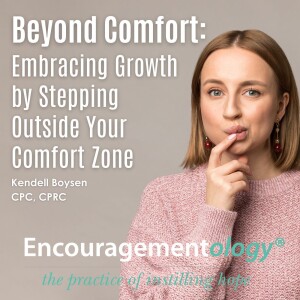
Tuesday Mar 25, 2025
Beyond Comfort: Embracing Growth by Stepping Outside Your Comfort Zone
Tuesday Mar 25, 2025
Tuesday Mar 25, 2025
SHOW NOTES:
On this show… we are going beyond comfort as we step outside of our comfort zones and embrace growth. We’ve all been there—nestled comfortably in our routines, sipping the same coffee, walking the same paths, and binge-watching that favorite series for the umpteenth time. It’s cozy, predictable, and safe. But have you ever wondered what lies beyond that snug bubble? What adventures, opportunities, and personal growth await when you dare to venture into the unknown?
Stepping outside your comfort zone isn’t just a catchy phrase; it’s a transformative journey that challenges your fears, bolsters your confidence, and shatters those pesky limiting beliefs. In this episode, we’ll explore the exhilarating (and sometimes nerve-wracking) world beyond our comfort zones. From understanding the psychology behind our fears to uncovering the hidden costs of staying stagnant, we’ll navigate this path together to discover how embracing discomfort can lead to unparalleled personal growth.
Let’s start at the beginning—what exactly is a “comfort zone”? Sounds cozy, right? Like fuzzy socks, predictable routines, and your favorite Netflix binge. But in psychological terms, your comfort zone is more than just what feels familiar. It’s a behavioral space where your activities and decisions fit a routine and pattern that minimizes stress and risk. Inside it, you’re cruising—things feel manageable, safe, and under control. But spoiler alert: not much growth happens there.
Now, stepping outside of that bubble? That’s where things get interesting. Psychologists have mapped this out into zones: beyond the comfort zone lies the learning zone, where you face new challenges, gain skills, and build resilience. Keep going and you’ll hit the growth zone—this is where purpose, confidence, and real transformation happen. It’s the place where you say yes to the things that scare you a little but excite you a lot. The catch? It’s also where the uncertainty lives. The fear. The doubt. That tiny inner voice that says, “Yeah but… what if I fail?”
And hey, that voice has a point—there is risk involved. But there’s also risk in staying stuck. The longer we stay in our bubble, the more we reinforce limiting beliefs—like “I’m not good at that,” or “That’s just not who I am.” These beliefs become like padded walls, keeping us “safe,” but also keeping us small. And here’s the wild part: you might not even realize you’re stuck. You might just feel low-grade frustration, boredom, or restlessness—like something’s missing but you can’t quite name it. That’s often your potential, knocking on the door, wondering when you’re going to invite it in.
Is It Time to Leave Your Comfort Zone? How Leaving Can Spark Positive Change
Michael Hyatt asks and answers; Are Your Beliefs Keeping You Stuck? Found on Full Focus
Joey Schweitzer on How the comfort zone is ruining your life
Here are five powerful ways to challenge limiting beliefs
- Talk Back to the Voice in Your Head
You know the one. That inner critic that says, “You’re not good at this,” or “Who do you think you are?” Call it out! Literally question it like a nosy neighbor:
- Says who?”
- “Is that actually true or just something I picked up along the way?”
When you start treating those beliefs like suggestions instead of facts, you regain control of the narrative.
- Look for the Evidence (and the Holes)
Take your limiting belief and pretend you’re a lawyer trying to prove or disprove it.
- Belief: “I’m not creative.”
- Evidence: Have you ever solved a problem in a new way? Cooked without a recipe? Decorated a space? Boom—creative.
Most limiting beliefs fall apart under even the gentlest cross-examination.
- Reframe the Story
Instead of saying “I always mess this up,” try “I’m still learning, and each attempt gets me closer.”
Reframing isn’t lying to yourself—it’s choosing a perspective that empowers instead of paralyzes you. Think of it like adjusting the lens on your camera: same scene, better focus.
- Take Micro-Actions That Prove It Wrong
One of the fastest ways to challenge a belief is to act in spite of it.
If you believe, “I’m not confident speaking up,” try asking a question in a meeting. Tiny actions stack up. And each time you do the thing you thought you couldn’t, that belief loses its power.
- Borrow Someone Else’s Belief
When your self-belief is shaky, lean on someone who sees you clearly. A coach, friend, mentor—someone who’s rooting for you.
Ask, “What do you see in me that I’m missing?” Sometimes we need to borrow confidence until we build our own.
CHALLENGE: Identify one area in your life where fear or complacency has kept you confined. Take a deliberate step this week to push beyond that boundary, no matter how small, and embrace the growth that awaits on the other side. Remember, life begins at the end of your comfort zone.
I Know YOU Can Do It!
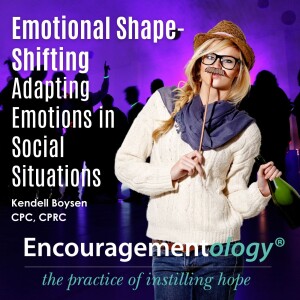
Wednesday Mar 19, 2025
Emotional Shape-Shifting: Adapting Emotions in Social Situations
Wednesday Mar 19, 2025
Wednesday Mar 19, 2025
SHOW NOTES:
On this show…we are diving into the idea of emotional shape-shifting or adapting our emotions and behaviors in different social situations. Have you ever found yourself slipping into the role of mood manager—filling awkward silences, lifting a heavy atmosphere, or shifting your tone just to keep the peace? Maybe you’ve walked into a room, scanned the emotional temperature, and instinctively adjusted yourself to fit in, smoothing out discomfort like a social glue stick. If so, congratulations! You might be what I like to call an Emotional Shape-Shifter—the person who intuitively adapts to meet others where they are. Sounds like a superpower, right? And in many ways, it is. This kind of emotional adaptability can build connections, ease tensions, and make you the go-to person for support and social harmony. But here’s the catch—when does being flexible turn into being too flexible? At what point do we stop adjusting and start erasing ourselves?
Think about it - constantly mirroring other people’s moods can be exhausting! If you’ve ever walked away from a conversation feeling emotionally drained—like you just carried the weight of someone else’s energy—you’re not alone. As a self-proclaimed shifter, I wanted to know, is emotional shape-shifting simply a form of empathy, or is it a close cousin of people-pleasing? And more importantly, how do we keep the good parts of this trait while setting boundaries that protect our own emotional well-being? Today, we’re diving into the art of emotional adaptability—when it’s a strength, when it’s a slippery slope, and how to find the balance between connection and self-preservation.
I was talking to a friend of mine about this idea and referred to myself as “the goo”...sounds weird, but think about it. Goo fills empty space.
Ever notice how you become a slightly different version of yourself depending on who you’re with or where you are? This isn’t about being fake – it’s something psychologists might call emotional shape-shifting, and it’s actually a normal part of human behavior. Emotional shape-shifting can be defined as the process of adjusting or changing your emotional expression to suit different situations or people. It draws on our capacity for emotional regulation – the ability to control or modulate our feelings – and on emotional mirroring, where we unconsciously mimic another person’s emotions to connect with them. In other words, it’s like being an “emotional chameleon”, instinctively adapting to the social environment to blend in or put others at ease.
There are no set criteria that define someone as a social chameleon, but common traits can include:
Empathy: Recognizing, relating, and responding to the thoughts and feelings of others.
Adaptability: Being able to change your behavior readily in different situations.
Open-mindedness: Always searching for a common ground with others’ beliefs and interests.
Social awareness: Being keen to subtle social cues, like body language, or shifts in others’ moods and behaviors.
Effective communication: Offering clear, engaging conversation and active listening.
Displaying interest: Asking questions and displaying interest in someone else’s passion.
Mimicking movements: Taking on movements of another to convey shared experiences, like smiling, nodding, or arm crossing.
On the School of Life’s YouTube Channel, I found How to Stop Being a People Pleaser
CHALLENGE: Be intentional with your own emotional shape-shifting – adapt to others when it feels right, but never at the cost of your true feelings and needs. Stay flexible and empathetic, yes, but also fiercely protective of your authenticity and personal boundaries.
I Know YOU Can Do It!

Wednesday Mar 12, 2025
From Dreams to Reality: Taking Action to Live Your Best Life
Wednesday Mar 12, 2025
Wednesday Mar 12, 2025
SHOW NOTES:
On this show…we are turning dreams into reality as we take action to live our best lives. Have you ever caught yourself saying, “One day, I’m going to…” or “I wish I could…” only to let time slip by without taking action? Maybe you’ve dreamed of starting your own business, writing a book, switching careers, or finally diving into that passion project you can’t stop thinking about. But somehow, between responsibilities, self-doubt, and the comfort of routine, those dreams get placed on the back burner. And the longer they sit, the easier it is to convince yourself that now just isn’t the right time. But let’s be real—if we wait for the perfect time, we might be waiting forever. So, what’s really holding us back? Is it fear? Lack of direction? The security of staying where we are, even if it isn’t fulfilling?
Today, we’re going to uncover the real reasons we stall on our dreams and, more importantly, how to break through the hesitation and take action. Because here’s the truth: the difference between “I wish” and “I did” is action. And that doesn’t mean making a drastic leap overnight—it means taking one small, intentional step in the right direction. Whether you’re looking to reinvent your career, start a side hustle for joy rather than money, or simply make progress toward something you love, this episode is for you. Let’s talk about the power of forward motion, break out of the predictable patterns that keep us stuck, and create a real, scalable plan to move from dreaming to doing. It’s time to get up and get going!
From the start, I had entrepreneurial aspirations! Not really sure why that is. I didn’t come from a family of entrepreneurs. My father was a professor and my mother a stay-at-home mother but as early as I can remember, I was creating opportunity. Not everything was a money-maker or even successful but that wasn’t really the most exciting part for me. It was the idea that turned into action. I saw opportunity everywhere. For instance, my neighbors were out of town and we had a big storm in my neighborhood. This took down a very large tree in their backyard. After an initial inspection I decided it would be cool to give neighborhood children a tour for a small entrance fee. After coming up with some compelling and elaborate stories about each nook and cranny of the fallen tree, we gave tours all day and made enough money to walk to town and treat ourselves with some goodies.
Now, I realize there is a time and place for any genius idea so I’m not suggesting checking the weather channel for the next big storm but I tell this story to say, what can you engineer from just a creative thought?
Let’s take a moment for some self-reflection. Grab a pen and paper, or open a notes app, and jot down your answers to these questions:
- What is a dream or passion you’ve been putting off?
Think about something you’ve always wanted to do but haven’t pursued yet.
- What fears or doubts have been holding you back?
Be honest with yourself—acknowledge any fear of failure, fear of success, or comfort in routine that’s keeping you from taking action.
- What small step can you take this week toward that dream?
Identify a manageable action that moves you closer to your goal, whether it’s researching, networking, or dedicating time to your passion.
The Real Reason You’re Afraid To Chase Your Dreams - from Bren on the Road
When asked…How can we overcome the fear of pursuing our dreams?. Deepak Chopra
At Observing Leslie, I found How the Obsession with Monetizing Hurts Us
On Gabby Bernstein’s YouTube channel, I found The First Step in Taking Action on Your Dream
CHALLENGE: Stop waiting for the “right time” and take the first bold step toward your dream today. Trust yourself, embrace the excitement of the unknown, and start creating the life you’ve been dreaming about—because the only thing standing between you and your future is action!
I Know YOU Can Do It!
